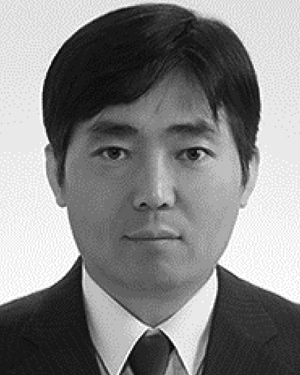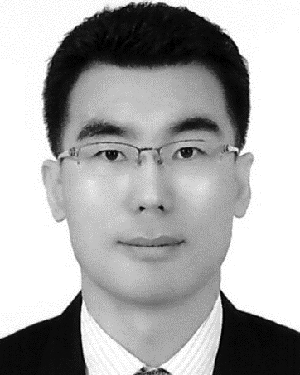Abstract:
In-band full-duplex (IFD) two-way relay (TWR) system becomes one among the major concern for maximizing system capacity in wireless network, where one relay node and two ...Show MoreMetadata
Abstract:
In-band full-duplex (IFD) two-way relay (TWR) system becomes one among the major concern for maximizing system capacity in wireless network, where one relay node and two source nodes using analog network coding (ANC) are deployed. This paper compares one-time-slot ANC (1TA) TWR, in which each node operates in IFD mode, with two-time-slot ANC (2TA) TWR, where each node is in in-band half-duplex mode. In addition, achievable sum rate of the 1TA-TWR is derived with adverse factors such as direct link interference as well as self-interference (SI), which is induced by IFD signaling. This paper proposes an iterative optimal power allocation (OPA) method to maximize the derived end-to-end sum rate, which is based on Lagrangian and Newton-Raphson algorithm under total power constraint. Numerical results elucidate the efficiency of the 1TA-TWR over the 2TA-TWR as the following: the 1TA-TWR based on the OPA becomes more and more viable than the 2TA-TWR based on existing OPA, as the relay node goes into the center of two source nodes, the link channel gain of mutual source nodes increases, and the SI channel gain approaches noise floor level.
Published in: IEEE Systems Journal ( Volume: 14, Issue: 1, March 2020)
Funding Agency:

Electronics and Telecommunications Research Institute, Daejeon, South Korea
University of Science & Technology, Daejeon, South Korea
Kapseok Chang received the M.S. and Ph.D. degrees in information and communications engineering from the Korea Advanced Institute of Science and Technology, Daejeon, South Korea, in 1999 and 2005, respectively.
Since July 2005, he has been with the Electronics and Telecommunications Research Institute, South Korea as a full-time Senior Researcher. Since September 2009, he has also been an Associate Professor of Mobile Comm...Show More
Kapseok Chang received the M.S. and Ph.D. degrees in information and communications engineering from the Korea Advanced Institute of Science and Technology, Daejeon, South Korea, in 1999 and 2005, respectively.
Since July 2005, he has been with the Electronics and Telecommunications Research Institute, South Korea as a full-time Senior Researcher. Since September 2009, he has also been an Associate Professor of Mobile Comm...View more

Department of Electrical Engineering, Chonnam National University, Gwangju, South Korea
Yonghoon Choi (M’10–SM’13) received the B.S. degree in electronics engineering from Sungkyunkwan University, Seoul, South Korea, in 1999, and the M.S. and Ph.D. degrees in information and communications engineering from the Korea Advanced Institute of Science and Technology, Daejeon, South Korea, in 2003 and 2010, respectively.
He was a Postdoctoral Visiting Scholar from 2010 to 2013 with the Department of Electrical Engin...Show More
Yonghoon Choi (M’10–SM’13) received the B.S. degree in electronics engineering from Sungkyunkwan University, Seoul, South Korea, in 1999, and the M.S. and Ph.D. degrees in information and communications engineering from the Korea Advanced Institute of Science and Technology, Daejeon, South Korea, in 2003 and 2010, respectively.
He was a Postdoctoral Visiting Scholar from 2010 to 2013 with the Department of Electrical Engin...View more

Electronics and Telecommunications Research Institute, Daejeon, South Korea
University of Science & Technology, Daejeon, South Korea
Kapseok Chang received the M.S. and Ph.D. degrees in information and communications engineering from the Korea Advanced Institute of Science and Technology, Daejeon, South Korea, in 1999 and 2005, respectively.
Since July 2005, he has been with the Electronics and Telecommunications Research Institute, South Korea as a full-time Senior Researcher. Since September 2009, he has also been an Associate Professor of Mobile Communication and Digital Broadcasting Engineering with the University of Science and Technology, South Korea. From March 2011 to February 2013, he was with the School of Engineering Science, Simon Fraser University, Canada as a Visiting Professor. His research interests include smart antennas, OFDM, synchronization, interference cancellation, in-band full-duplex (IFD) realization, and cellular IoT systems.
Dr. Chang made the standardization activities of 3GPP LTE (2005–2007) and IEEE 802.11ad (2009-2010), he developed the prototype of IFD system (2014–2015). During his Ph.D., he won the Brain Korea Scholarship. From IEEE 802.11ad (2012), Korean Ministry of Commerce, Industry and Energy (2018), and ETRI (2019), he was honored with the Certificate of Appreciation, the Day of the Inventions, and the Best Patent Award, respectively.
Kapseok Chang received the M.S. and Ph.D. degrees in information and communications engineering from the Korea Advanced Institute of Science and Technology, Daejeon, South Korea, in 1999 and 2005, respectively.
Since July 2005, he has been with the Electronics and Telecommunications Research Institute, South Korea as a full-time Senior Researcher. Since September 2009, he has also been an Associate Professor of Mobile Communication and Digital Broadcasting Engineering with the University of Science and Technology, South Korea. From March 2011 to February 2013, he was with the School of Engineering Science, Simon Fraser University, Canada as a Visiting Professor. His research interests include smart antennas, OFDM, synchronization, interference cancellation, in-band full-duplex (IFD) realization, and cellular IoT systems.
Dr. Chang made the standardization activities of 3GPP LTE (2005–2007) and IEEE 802.11ad (2009-2010), he developed the prototype of IFD system (2014–2015). During his Ph.D., he won the Brain Korea Scholarship. From IEEE 802.11ad (2012), Korean Ministry of Commerce, Industry and Energy (2018), and ETRI (2019), he was honored with the Certificate of Appreciation, the Day of the Inventions, and the Best Patent Award, respectively.View more

Department of Electrical Engineering, Chonnam National University, Gwangju, South Korea
Yonghoon Choi (M’10–SM’13) received the B.S. degree in electronics engineering from Sungkyunkwan University, Seoul, South Korea, in 1999, and the M.S. and Ph.D. degrees in information and communications engineering from the Korea Advanced Institute of Science and Technology, Daejeon, South Korea, in 2003 and 2010, respectively.
He was a Postdoctoral Visiting Scholar from 2010 to 2013 with the Department of Electrical Engineering, Stanford University, USA. From February 2018 to January 2019, he was with the Laboratory of Signals and Systems, Centrale Supelec, France as a Visiting Professor. Since 2014, he has been with the Department of Electrical Engineering, Chonnam National University, South Korea, where he is currently an Associate Professor. His research interests include design, analysis, and optimization of wired/wireless communication systems, smart grid communications and networking, network economics, and IT convergence network.
Yonghoon Choi (M’10–SM’13) received the B.S. degree in electronics engineering from Sungkyunkwan University, Seoul, South Korea, in 1999, and the M.S. and Ph.D. degrees in information and communications engineering from the Korea Advanced Institute of Science and Technology, Daejeon, South Korea, in 2003 and 2010, respectively.
He was a Postdoctoral Visiting Scholar from 2010 to 2013 with the Department of Electrical Engineering, Stanford University, USA. From February 2018 to January 2019, he was with the Laboratory of Signals and Systems, Centrale Supelec, France as a Visiting Professor. Since 2014, he has been with the Department of Electrical Engineering, Chonnam National University, South Korea, where he is currently an Associate Professor. His research interests include design, analysis, and optimization of wired/wireless communication systems, smart grid communications and networking, network economics, and IT convergence network.View more


